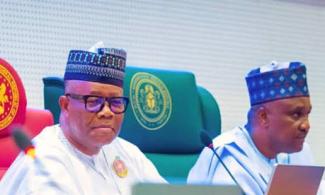EXCLUSIVE: How Relatives of Senate President Akpabio, Speaker Abbas, Other Political Elites Secured NCC Jobs Without Due Process
By Sahara Reporters
Copyright saharareporters

The Nigerian Communications Commission (NCC) has been enmeshed in a storm of allegations that threaten to cripple the commission’s credibility and destabilise the country’s telecoms sector.
At the centre of the controversy is the commission’s Executive Vice Chairman (EVC), Dr. Aminu Wada Maida, whose leadership has drawn sharp criticism from staff, insiders, and industry observers.
Maida has been accused of recruitment and promotion manipulation, nepotism, deliberately ignoring the welfare of staff, victimisation of staff who speak out over their challenges or oppose him, sabotaging the commission to destabilise Nigeria’s telecom sector, and secretly funding opposition politicians in the north against President Bola Tinubu.
Attempted Suicide Of Staff Member Sparks Outcry
Multiple sources within the NCC told SaharaReporters that a staff member of the commission attempted to commit suicide on August 27, 2025, due to his inability to cater for his family and pay off a piled-up debt.
The sources attributed the attempted suicide by the NCC’s staff member to the poor welfare of staff in the Commission.
“Other allegations are coming out gradually since the new EVC, Dr Aminu Maida, became the Head of the Commission,” one of the sources said.
Alleged Sabotage and Political Deals
Beyond welfare concerns, insider sources accused Maida of holding clandestine meetings with northern elites abroad, allegedly to undermine President Tinubu’s administration.
“Having had clandestine meetings with the northern elite to undermine the Government of President Tinubu, Dr Aminu Maida has been funding the opposition secretly using the Commission, consultants and contractors,” another insider said.
“Dr Maida is seeking favours and political relevance from the opposition after successfully toppling the APC government. These meetings held outside Nigeria are strategic,” the insider source added.
Maida’s Strained Relationship With Communications Minister
Insider sources said that Maida’s strained relationship with the Minister of Communications, Innovation, and Digital Economy, Dr. ‘Bosun Tijani, has further fuelled suspicions of his alleged fraudulent activities.
According to insiders, the ministry is checkmating his plans, a development that has left him displeased.
Workers further alleged that Maida’s leadership has been marred by fraudulent and manipulated recruitment and promotions, as well as the fraudulent sale of government assets, and preferential treatment for individuals tied to powerful politicians.
Insider sources said Maida’s leadership “is under intense scrutiny following a surge of allegations that include fraudulent recruitment practices, manipulated promotions, flagrant disregard for government policies, fraudulent practices, sale of government assets without due process, ungraded utterances, and preferential treatment of certain regions in internal appointments and travels.”
According to sources, the controversial promotion exercise, allegedly skewed in favour of individuals from a particular region and political class/relevance, has been seen by many in the commission as undermining the principles of meritocracy and national unity.
“Evidence showed that some staff were given exam questions before, and others paid to have their names in the promotion list,” an insider source alleged.
“This ranged from $2,000 and above to avoid tracing,” the source added.
The sources also alleged that several high-profile appointments have come under the spotlight in the commission.
“The daughter of the Senate Committee Chairman on Telecommunications, Senator Ikra Aliyu Bilbis, secured a position within the commission without a competitive process,” one of the sources told SaharaReporters.
“Same as relatives of the Senate President Godswill Akpabio and Speaker of the House of Representatives, Tajudeen Abbas,” the source added.
According to one of the sources, “Another beneficiary is Tanimu Yakubu, reportedly the EVC’s cousin’s daughter, who was employed through backdoor channels. Likewise, Katsina governor’s brother-in-law.”
They noted that what is most troubling is the case of a relative of the Senate President, Akpabio, who was fast-tracked through probation while abroad and subsequently seconded to another agency by bypassing standard recruitment procedures.
“A relative of the First Lady, wife of the President, Senator Oluremi Tinubu, was shown the way out for drug charges,” a source said.
“The son of the lawyer of the Vice President and the brother of a former aide to the former Governor Nasir El-Rufai were also sacked to open a way to seek political favours.”
These cases, staff sources argued, are not mere administrative oversights but a symptom of entrenched elite patronage and the erosion of institutional norms.
Sources noted that the implications of the allegations are far-reaching, emphasising the danger of when regulatory agencies become vehicles for personal and political patronage.
“The EVC has been romancing northern elders to secure a political footing. Ex-Governor Aliyu Wamakko and some others are among the list,” a source told SaharaReporters.
Another insider source said, “The EVC is on record for taking more trips overseas than the President, even after the presidential pronouncement on international travels, blatantly disobeying the President without remorse.
“The EVC has been receiving kickbacks from contractors, cornering contracts, and diverting them to his companies.
“Workforces have been used to conduct recruitments, promotion exams, and other jobs in the commission with outrageous payments.
“Lagos Business School is also in these corruption allegations. They are also being used to cover up huge amounts as justification for use.
“The auctioning of the Commission properties in various states in Nigeria was done secretly to favour loyalists.”
The insider sources also accused Maida of the “mismanagement of Emergency Contract Centre (ECC) funds and taking trips that the commission pays for personal business.”
Promotion Scandal
SaharaReporters reported in March that the 2025 staff promotion exercise was riddled with irregularities, favouritism, and ethnic bias.
Staff called it “a fraudulent, bigoted, and sadistic process.”
The Human Capital Department admitted logistical failures, with some candidates tested for nearly 24 hours.
While sources said an apology letter acknowledged the distress, they alleged that the results of the exam were manipulated to favour Maida’s cronies, while some staff members paid up to $2,000 to appear on promotion lists.
Despite public service rules setting a 60% pass mark, insider sources said the EVC raised the commission’s pass mark to 70% without approval, “denying many promotions.
Staff sources also accused Maida of sidelining entire regions and breaching federal character principles in his recruitment and promotion activities.
Whistleblowers Targeted
According to some staff members, Maida’s leadership appears to focus more on silencing dissent by oppressing staff members of the commission than addressing the underlying issues. The EVC, through the Director of Human Capital, has issued verbal threats to all staff members of the commission.
The sources stated that Maida’s alleged leadership campaign of intimidation is an attempt to stifle the growing chorus of staff who have spoken out about mismanagement and promotion irregularities within the commission.
“His incompetence, victimisation and fraudulent acts are inimical to the growth of the telecom industry,” a source said.
Another insider told SaharaReporters that rather than addressing the allegations with transparency, a commitment to institutional reforms and improved staff welfare, “the EVC has shifted focus to rooting out whistleblowers within the commission.”
Multiple sources described the situation at the commission as “a climate of fear, suffering and intimidation in which long-serving and high-performing staff are being singled out and victimised, accused of leaking sensitive information to the media and acquiring information among staff for victimisation.”
“The beginning of the war has just started,” one staff member told SaharaReporters, highlighting the resolve of those determined to expose wrongdoing in the commission despite the threat of reprisals.
The sources noted that the commission thrived before Maida’s leadership, but when staff members questioned the commission’s revenue decline, the EVC said, “The Commission did not sell spectrum.”
However, insider sources told SaharaReporters that records showed that the commission had previously generated income regardless of spectrum sales.
“His incompetence and constant travels have left the commission helpless,” a source said.
They also alleged bribery from contractors through whom Maida allegedly sold government assets secretly and without due process.
He was also accused of outsourcing office work to companies that gave him kickbacks, including the workforce, which was allegedly used to manipulate promotion results in favour of loyalists.
“Staff welfare is at an all-time low. Salaries have not been adjusted despite the economic crisis, leaving staff borrowing to survive while loyalists enjoy foreign trips,” one of the sources said.
Maida allegedly told staff of the commission, “If you feel other organisations have increased their salaries, resign and go there because I will not do the same.”
Resignation of Staff
Sources told SaharaReporters that over 30 staff members of the NCC have resigned since Maida’s appointment, citing threats, intimidation, and poor working conditions.
“Some were forced out quietly, others left for greener pastures. To stem exits, he introduced a cooperative governance policy preventing staff from working in other telecom firms,” a source said.
Some sources, who were staff members of the commission, stressed the need to restore global best practices.
“Ghana has now become a benchmark for the Nigerian telecom industry,” one analyst said, noting security issues linked to poor oversight.
A source told SaharaReporters, “If the EVC believes that victimising staff will silence the truth, then he underestimates the very force that built this commission.”
The revelations have prompted calls for urgent intervention from the National Assembly, the Presidency, and anti-corruption agencies to investigate the matter before it becomes a national threat to the telecoms industry.
SaharaReporters’ attempts to reach the NCC for comment were unsuccessful, as several calls made to its telephone number went unanswered.
Follow the Sahara Reporters channel on WhatsApp: https://whatsapp.com/channel/0029VaFClvtH5JM6SSsP7M2Y



